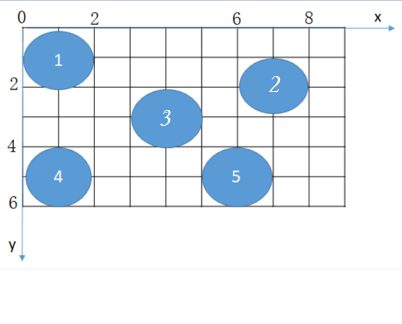AI面板识别 - 华为OD统一考试
2023-12-29 14:35:29
OD统一考试 (B卷)
分值: 100分
题解: Java / Python / C++

题目描述
AI识别到面板上有N(1 ≤ N ≤ 100)个指示灯,灯大小一样,任意两个之间无重叠。
由于AI识别误差,每次别到的指示灯位置可能有差异,以4个坐标值描述AI识别的指示灯的大小和位置(左上角x1,y1,右下角x2,y2),
请输出先行后列排序的指示灯的编号,排序规则:
- 每次在尚未排序的灯中挑选最高的灯作为的基准灯;
- 找出和基准灯属于同一行所有的灯进行排序。两个灯高低偏差不超过灯半径算同一行(即两个灯坐标的差 ≤ 灯高度的一半)。
输入描述
第一行为N,表示灯的个数
接下来N行,每行为1个灯的坐标信息,格式为:
编号 x1 y1 x2 y2
- 编号全局唯一
- 1 ≤ 编号 ≤ 100
- 0 ≤ x1 < x2 ≤ 1000
- 0 ≤ y1 < y2 ≤ 1000
输出描述
排序后的编号列表,编号之间以空格分隔
示例1
输入:
5
1 0 0 2 2
2 6 1 8 3
3 3 2 5 4
5 5 4 7 6
4 0 4 2 6
输出:
1 2 3 4 5

题解
题目就是一道模拟排序题。
其实就是先按行,再按列进行排序,这里的行不是严格的行(在一定范围内可以认为是同行)。数据量不大可以直接按照题目要求进行模拟得到答案即可。
Java
import java.util.ArrayList;
import java.util.Comparator;
import java.util.List;
import java.util.Scanner;
/**
* @author code5bug
*/
class Light {
int no, x1, y1, x2, y2;
public Light(int no, int x1, int y1, int x2, int y2) {
this.no = no;
this.x1 = x1;
this.y1 = y1;
this.x2 = x2;
this.y2 = y2;
}
}
public class Main {
public static void main(String[] args) {
Scanner scanner = new Scanner(System.in);
int N = scanner.nextInt();
List<Light> lights = new ArrayList<>();
for (int i = 0; i < N; i++) {
int no = scanner.nextInt();
int x1 = scanner.nextInt();
int y1 = scanner.nextInt();
int x2 = scanner.nextInt();
int y2 = scanner.nextInt();
lights.add(new Light(no, x1, y1, x2, y2));
}
// 指定编号的指示灯是否已选择
boolean[] selected = new boolean[101];
// 排序后的编号列表
List<Integer> sortedRst = new ArrayList<>();
while (true) {
// 在尚未排序的灯中挑选最高的灯作为的基准灯
Light baseLight = null;
for (Light light : lights) {
if (selected[light.no]) continue;
if (baseLight == null || baseLight.y1 > light.y1) {
baseLight = light;
}
}
if (baseLight == null) break;
// 找出和基准灯属于同一行所有的灯进行排序。两个灯高低偏差不超过灯半径算同一行
// (即两个灯坐标的差 ≤ 灯高度的一半)。
List<int[]> lineLights = new ArrayList<>();
// 灯半径
double lightRadius = (baseLight.y2 - baseLight.y1) / 2.0;
for (Light light : lights) {
int no = light.no, y1 = light.y1;
if (selected[no]) continue;
if (y1 - baseLight.y1 <= lightRadius) {
lineLights.add(new int[]{light.x1, no});
}
}
// 同一行,按照列进行排序
lineLights.sort(Comparator.comparingInt(a -> a[0]));
for (int[] light : lineLights) {
int no = light[1];
selected[no] = true;
sortedRst.add(no);
}
}
// 打印排序结果
for (int no : sortedRst) {
System.out.print(no + " ");
}
}
}
Python
N = int(input())
lights = [tuple(map(int, input().split())) for _ in range(N)]
# 指定编号的指示灯是否已选择
selected = [False] * 101
# 排序后的编号列表
sorted_rst = []
while True:
# 在尚未排序的灯中挑选最高的灯作为的基准灯
base_light = None
for light in lights:
no, x1, y1, x2, y2 = light
if selected[no]:
continue
if not base_light or base_light[2] > y1:
base_light = light
if not base_light:
break
# 找出和基准灯属于同一行所有的灯进行排序。两个灯高低偏差不超过灯半径算同一行(即两个灯坐标的差 ≤ 灯高度的一半)。
line_lights = []
# 灯半径
light_radius = (base_light[4] - base_light[2]) / 2
base_light_y1 = base_light[2]
for light in lights:
no, x1, y1, x2, y2 = light
if selected[no]:
continue
if y1 - base_light_y1 <= light_radius:
line_lights.append((x1, no))
# 同一行,按照列进行排序
line_lights.sort()
for x1, no in line_lights:
selected[no] = True
sorted_rst.append(no)
print(*sorted_rst)
C++
#include <iostream>
#include <vector>
#include <algorithm>
using namespace std;
class Light {
public:
int no, x1, y1, x2, y2;
Light(int no, int x1, int y1, int x2, int y2)
: no(no), x1(x1), y1(y1), x2(x2), y2(y2) {}
};
int main() {
int N;
cin >> N;
vector<Light> lights;
for (int i = 0; i < N; i++) {
int no, x1, y1, x2, y2;
cin >> no >> x1 >> y1 >> x2 >> y2;
lights.emplace_back(no, x1, y1, x2, y2);
}
// 指定编号的指示灯是否已选择
vector<bool> selected(101, false);
// 排序后的编号列表
vector<int> sortedRst;
while (true) {
// 在尚未排序的灯中挑选最高的灯作为的基准灯
Light* baseLight = nullptr;
for (auto& light : lights) {
if (selected[light.no]) continue;
if (!baseLight || baseLight->y1 > light.y1) {
baseLight = &light;
}
}
if (!baseLight) break;
// 找出和基准灯属于同一行所有的灯进行排序。两个灯高低偏差不超过灯半径算同一行
// (即两个灯坐标的差 ≤ 灯高度的一半)。
vector<pair<int, int>> lineLights;
// 灯半径
double lightRadius = (baseLight->y2 - baseLight->y1) / 2.0;
for (auto& light : lights) {
int no = light.no, y1 = light.y1;
if (selected[no]) continue;
if (y1 - baseLight->y1 <= lightRadius) {
lineLights.emplace_back(light.x1, no);
}
}
// 同一行,按照列进行排序
sort(lineLights.begin(), lineLights.end());
for (auto& light : lineLights) {
int no = light.second;
selected[no] = true;
sortedRst.push_back(no);
}
}
// 打印排序结果
for (int no : sortedRst) {
cout << no << " ";
}
return 0;
}
🙏整理题解不易, 如果有帮助到您,请给点个赞 ???? 和收藏 ?,让更多的人看到。🙏🙏🙏
文章来源:https://blog.csdn.net/user_longling/article/details/135289518
本文来自互联网用户投稿,该文观点仅代表作者本人,不代表本站立场。本站仅提供信息存储空间服务,不拥有所有权,不承担相关法律责任。 如若内容造成侵权/违法违规/事实不符,请联系我的编程经验分享网邮箱:veading@qq.com进行投诉反馈,一经查实,立即删除!
本文来自互联网用户投稿,该文观点仅代表作者本人,不代表本站立场。本站仅提供信息存储空间服务,不拥有所有权,不承担相关法律责任。 如若内容造成侵权/违法违规/事实不符,请联系我的编程经验分享网邮箱:veading@qq.com进行投诉反馈,一经查实,立即删除!